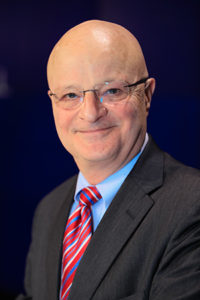 When Pat Sullivan joined Insulet (NSDQ:PODD) in 2014, the Billerica, Mass.-based company was reeling in roughly $300 million in revenue selling its Omnipod tubless insulin delivery system. Sullivan, a veteran of the medtech industry, saw a path to creating a billion-dollar company and it centered around the concept of making life easier for people with diabetes.
When Pat Sullivan joined Insulet (NSDQ:PODD) in 2014, the Billerica, Mass.-based company was reeling in roughly $300 million in revenue selling its Omnipod tubless insulin delivery system. Sullivan, a veteran of the medtech industry, saw a path to creating a billion-dollar company and it centered around the concept of making life easier for people with diabetes.
“I have an attraction to bringing new and innovative technology to market and I was totally enamored with the Omnipod. I understood why this product should be the standard of care in insulin delivery and I’ve been working for the last four years to make that happen,” he told Drug Delivery Business News.
The Omnipod system, which has been on the market for years, is steadily advancing in the U.S. and abroad – earlier this year, the Centers for Medicare and Medicaid Services issued guidance noting that Insulet’s Omnipod product could be covered by the Medicare Part D prescription drug program, extending the system to 450,000 people with Type 1 diabetes across the U.S.
But the company’s latest regulatory win represents the future of its product portfolio, according to Sullivan. In June, the FDA granted 510(k) clearance for Insulet’s Omnipod Dash insulin management system, which wirelessly connects the system’s Personal Diabetes Manager with the tubeless, waterproof pump.
Using blood glucose readings from the Contour Next One blood glucose meter, the PDM calculates how much insulin should be administered. Altogether, the system connects via Bluetooth to the Omnipod Display and View mobile apps, giving users and caregivers access to insulin therapy data.
Incorporating Bluetooth technology into the Pods and the PDM was seen as a crucial step for the company’s platform, Sullivan noted.

“That just seemed to be the way in which the world was going, particularly as it relates to the medical device industry,” he said. “Really, what’s remarkable is that from start to finish, it was a two-year program to get us from a concept to an FDA-cleared product.”
Insulet’s CEO added that the new Dash configuration will be used for the company’s future development efforts, including its partnership with Eli Lilly (NYSE:LLY) and its Omnipod Horizon artificial pancreas program.
“There are a lot of efficiencies, in terms of engineering know-how and the ability to advance in a platform and not have to start from scratch every time,” Sullivan said.
The company’s Horizon system, which has been closely watched by the diabetes community, has been tested on close to 100 patients, according to Sullivan. He said that Insulet expects to bring the product to market in late 2019 or early 2020.
All automated insulin delivery systems are made up of similar components – an insulin pump, a continuous glucose monitor and an algorithm to adjust the dose of insulin being delivered based on CGM data.
“The wonderful thing about our product is that the actual algorithm will be resident on the Pod. It will have a software chip in the Pod, on which this algorithm will reside,” Sullivan said.
This design feature will allow the Omnipod Horizon system to remain tubeless, he said.
“With the Pod having the software or the algorithm on it, you don’t need the PDM. You can still remain in closed-loop control while you’re running or while you’re swimming, as opposed to Medtronic’s 670G, for example. If you want to go running or go swimming, you have to take the device off. We will be able to keep you in closed-loop control for the full three-day wear that the person will have with the Pod,” Sullivan said. “No one else in the industry has that capability.”
Advancing the Dash platform, taking over its commercial activities in Europe, moving forward with the Horizon program – it’s all a part of Sullivan’s plan to turn Insulet into a billion-dollar company. But beyond the finances, he sees an opportunity to change the way patients think about managing their diabetes.
“Our whole philosophy is to make the life of people with Type 1 diabetes simpler,” he said. “Our focus is to reduce the burden on those individuals and just make their lives easier.”

